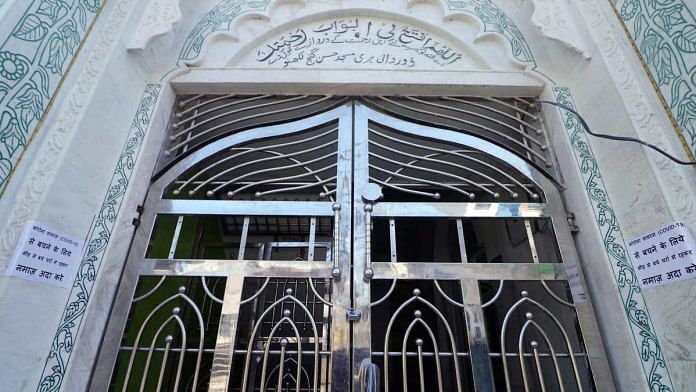

The Shri Badrinath Kedarnath Temple Committee in Lucknow has decided to ban the purchase of prasad from nearby shops, urging devotees to offer only homemade prasad or dry fruits at the temple. This decision comes after a meeting with the committee for food safety to prevent any impurity or contamination in the prasad being offered to the deities. Similar instructions are being given at other temples in the city as well. Vendors are also required to have valid licenses and undergo training on food safety regulations. This decision is in stark contrast to the previous recommendation by the Mahant of the temple to buy prasad and flowers from shops to support local businesses.
The Shri Badrinath Kedarnath Temple Committee (SBKTC) in Lucknow has implemented a ban on the purchase of prasad from nearby shops. This decision came after a meeting with the committee for food safety to prevent any impurity or contamination in the prasad being offered to the deities. Similar actions are being taken at other temples in the city as well.
Background:
In the past, there have been instances of contaminated prasad being offered at temples. This has led to concerns about the safety and purity of the offerings. The SBKTC has taken this measure to ensure that the prasad offered to the deities is of the highest quality and meets food safety standards.
Details of the Ban:
Top 5 FAQs and Answers:
1. Why has the SBKTC banned the purchase of prasad from shops?
A: To prevent any impurity or contamination in the prasad offered to the deities.
2. What is considered acceptable prasad?
A: Homemade prasad or dry fruits.
3. Are vendors still allowed to sell prasad outside the temple?
A: No, the sale of prasad from shops near the temple is prohibited.
4. What are the consequences for vendors who violate the ban?
A: Vendors who violate the ban may face legal action and/or have their licenses revoked.
5. How can devotees get prasad if they do not want to make it themselves?
A: Devotees can purchase dry fruits from licensed vendors and offer them as prasad.
Conclusion:
The SBKTC's decision to ban the purchase of commercial prasad is a significant step towards ensuring the safety and purity of the offerings made to the deities. It is important for devotees to comply with these regulations and offer only acceptable forms of prasad. This measure is in line with the temple's commitment to providing a sacred and respectful environment for pilgrims.

Shani Jayanti, the day dedicated to the worship of Lord Shani, falls on May 27, 2025, coinciding with Jyeshtha Amavasya. As per Udayatithi, the puja and rituals should be performed on the same day. However, certain tasks should be avoided on Shani Jayanti. Read on to know the significance of this day and the dos and don'ts to please Shani Dev.

Chief Minister Yogi Adityanath visited the Shanti Ashram in Lucknow to pay his last respects to Sant Shiromani Sai Chanduram, the head priest of the Ashram. He draped the mortal remains of Sant Shiromani with a saffron Angvastra and paid homage before his statue. Expressing deep sorrow over his demise, the Chief Minister wrote on social media about the irreparable loss of the spiritual leader. A large number of devotees gathered at the Ashram premises to offer their tributes and follow his teachings and ideals.

In an effort to improve vision care in rural India, the Bhaktivedanta Hospital & Research Institute held a Mega Eye & Dental Camp in Barsana, Uttar Pradesh. Equipped with state-of-the-art technology, the hospital aims to perform over 5000 PHACO procedures, free of cost, for those in need. The support of Tata Capital Ltd. enabled the camp to expand its reach to over 50,000 beneficiaries and receive the support of esteemed dignitaries including Smt. Hema Malini Ji and Smt. Nupur Desai.

Indian society has a narrow and sexist definition of parvarish, praising daughters who conform to traditional gender roles and blaming parents if they don't. However, it's time to focus on dismantling patriarchy within the household and raise a feminist generation. This means providing equal education to both daughters and sons, encouraging critical thinking and questioning societal norms. Parvarish should not mean curbing basic legal rights but rather empowering individuals to make their own decisions and think for themselves.

India's festival of lights, Deepawali, has been officially recognized by UNESCO as an intangible cultural heritage of humanity. The inscription acknowledges the festival's cultural significance and its ability to bring communities together. Prime Minister Narendra Modi welcomed the announcement, stating that Deepawali holds a special place in India's culture and represents values such as hope and righteousness. This recognition is expected to increase the festival's global popularity even further.

During Prime Minister Narendra Modi's recent visit to Tokyo, the city welcomed him with the soulful chanting of the Gayatri Mantra, one of the most sacred and powerful verses in Indian spiritual tradition. This ancient mantra, found in the Rig Veda, is believed to have a mental healing effect due to its repetitive and focused chanting. Research has also shown that it can improve well-being and provide a sense of peace and connection for both religious and non-religious individuals.

The M3M Foundation unveils 'Payal@40' campaign to commemorate Dr. Payal Kanodia's 40th birthday on December 9, 2025. This campaign, which aims for comprehensive impact across education, healthcare, skill development, and women's empowerment, reflects a leadership approach rooted in service and compassion. With the vision of Dr. Kanodia, the campaign marks a pivotal moment for the Foundation's ongoing mission of equitable development in India.

In a unique move to promote tourism, Madhya Pradesh Chief Minister Mohan Yadav has planned to hold cabinet meetings at famous heritage sites in the state. The latest meeting will take place at Khajuraho Convention Centre, known for its architectural wonders. The two-day visit will also include a jungle safari in Panna Tiger Reserve and review meetings of various departments, highlighting the state's vast natural and cultural beauty.

The main accused and owners of the Goa nightclub where a massive fire killed 25 people have fled to Phuket, according to Goa Police. The police have coordinated with Interpol to apprehend the accused as a Look Out Circular was issued against them. Meanwhile, an employee of the club has been arrested and the postmortem on all 25 deceased has been completed.

Experience a global perspective with the launch of "October 20, 2025e-Paper". Get your daily dose of news and reviews from cinema and streaming in "First Day First Show". Stay updated on the top 5 technology stories with "Today's Cache" and simplify science with "Science For All". Decode the headlines with hard facts in "Data Point" and learn to prioritize your health in "Health Matters". Stay updated on the literary world with "The Hindu On Books". All in one place!